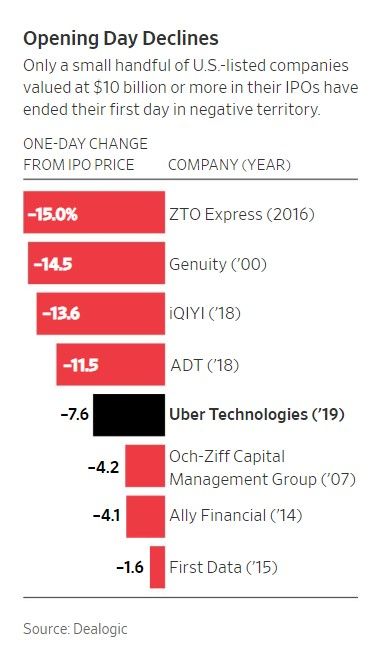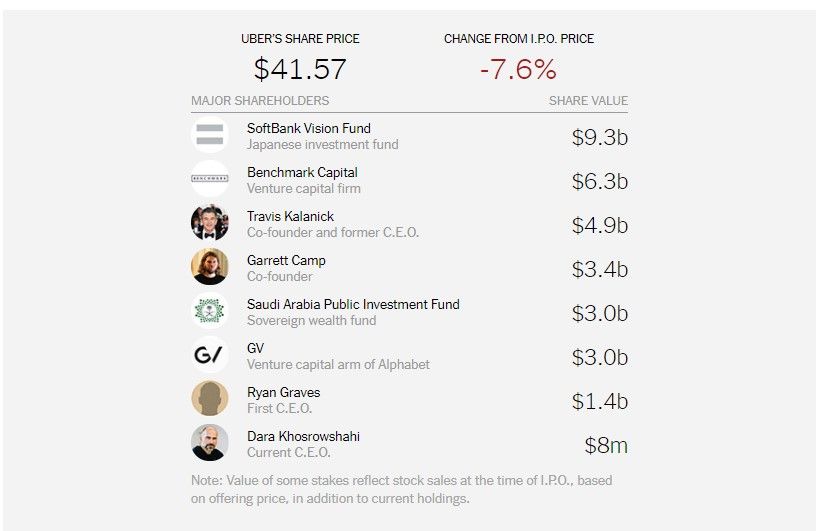TradingTips.com |
| What Uber Means for the Stock Market, and How to Trade the Next IPO Like Warren Buffett Posted: 16 May 2019 09:00 AM PDT The headlines were brutal. St least some of them were. Gizmodo exclaimed, "Congratulations to Uber, the Worst Performing IPO in U.S. Stock Market History." The story explained that trading had not gone as expected for the ride hailing service. Uber "finally debuted on the New York Stock Exchange today, in the middle of international trade uncertainty and following a massive, international strike by its own drivers, how'd it do? According to University of Florida professor Jay Ritter, Uber's 7.62 percent decline since hitting the NYSE makes it "bigger than first day dollar losses of any prior IPO in the U.S." In terms of percentage losses, Uber's dip doesn't even scratch the surface of the worst IPOs. But the staggering valuation of the company makes it, in raw scale, "among the top 10 IPOs ever" including companies outside the U.S., Ritter told Gizmodo in a phone interview. That single digit decline resulted in an estimated $617 million paper losses. Consider also that Uber's debut valuation of $76.5 billion was a considerable drop from the between $90 billion and $120 billion the company had been worth in some analysts estimation just a month earlier—one meant to stanch the forthcoming bleeding that had begun with competitor Lyft's bellyflop IPO. This defensive position did little to keep Uber or its investors from taking on water within a single day of trading. According to one analyst, the company may be profitable by 2024, though its only real plan so far is to continue to screw workers and eventually replace them with unproven technology. As former CEO Travis Kalanick said in 2014, "the reason that Uber could be expensive is you're not just paying for the car, you're paying for the other dude in the car who's driving." Presently, investors are probably realizing that what they're paying for is an unsustainable company so huge that its main justification for existing is sunk cost." The Wall Street Journal used the news as a chance to review the company's history: The drop is a blemish for the San Francisco-based company, which staged one of the most anticipated IPOs ever. It took a conservative approach to pricing the IPO to entice buyers: After dialing back valuation expectations, Uber priced near the low end of its target range. But the strategy wasn't conservative enough. After a celebratory bell-ringing ceremony at the New York Stock Exchange, the trading floor got quiet and the mood soured as orders came in and it became clear the stock would open in the red. About 10 minutes before noon, more than 30 million shares changed hands at $42, kicking off trading below the $45 IPO price.
Source: The Wall Street Journal "We knew we'd have a volatile day ahead of us," Uber Chief Executive Dara Khosrowshahi said in an interview with The Wall Street Journal after trading started. He added that Uber is "a company that has been through a ton of volatility in its history, and we've always come through." Founded in 2009, Uber broke private financing records, changed the way the world thinks about transportation and rewrote the startup playbook. It also traveled a long and tumultuous road to its IPO. Its co-founder Travis Kalanick was pushed out in 2017 after scandals at the company, including allegations of sexual harassment and discrimination. Mr. Khosrowshahi took the helm shortly thereafter to help prepare the company for an IPO. Uber is trying to become the destination for all forms of transportation, but it faces obstacles that threaten to derail it. An onslaught of competition helped inflate Uber's loss to more than $3.7 billion for the 12 months ending in March, by far the biggest loss by a U.S. startup in the year before an IPO, according to S&P Global Market Intelligence. Uber's revenue growth has also flatlined, a problem for a company that pitched itself as one defined by growth. Uber has attributed its stalling growth to aggressive competition around the globe, with cash-infused rivals pushing deals to woo riders and drivers. Uber has had to fight back with costly discounts to riders and subsidies to drivers, and it has lost market share in some major markets." Despite the decline in the stock, the company's early shareholders still have significant gains.
Source: The New York Times Few of the insiders sold significant stakes during the IPO but they can sell their shares, or at least many of the unrestricted shares they may own, in a few months. Insiders are usually required to hold shares for six months after an IPO, a period of time known as a lockup. When the lockup expires, there could be selling pressure on the stock and many IPOs do suffer a decline in the weeks after the lockup ends. That could be a better time to consider buying shares in the company. The first day of trading was a reminder of the risks of an IPO. It could be best to avoid as some of the world's greatest investors do. Warren Buffett and his partner Charlie Munger were asked about IPOs by CNBC’s Becky Quick in an interview earlier this week (the video is here and the comments are at 1:12:56). Here’s an excerpt from their replies: Buffett: I don’t think Berkshire’s ever bought a new issue. I mean, the idea of saying that the best place in the world I can put my money is something where all the selling incentives are there, commissions are higher, the animal spirits… That’s going to be better than a thousand other things I can buy where there is no similar selling enthusiasm and the desire to get the deal done and the extra commissions… that’s the single best thing to buy on a given day? Munger: I can’t think of a time we’ve ever done it… we’ve never bought one. Buffett: It just doesn’t make any sense. We like to buy things where nobody’s making a dime selling them to us. Munger: There’s a lot of lying in modern finance. Uber investors could fare best if they remember those words. |
| You are subscribed to email updates from TradingTips.com. To stop receiving these emails, you may unsubscribe now. | Email delivery powered by Google |
| Google, 1600 Amphitheatre Parkway, Mountain View, CA 94043, United States | |



No comments:
Post a Comment